2 days in Qufu + The best places to eat
Located in the heart of Shandong Province, Qufu stands as a timeless testament to China’s rich history and cultural heritage. Renowned as the hometown of Confucius, the great philosopher and educator, Qufu is a pilgrimage site for those seeking to pay homage to his teachings and legacy. As you wander the ancient streets of Qufu, you’ll encounter traditional architecture, charming tea houses, and a palpable sense of reverence for Confucian philosophy. Beyond the cultural treasures, Qufu’s natural beauty, with its scenic landscapes and lush parks, offers a serene backdrop to explore the profound influence of Confucianism. Qufu promises a captivating journey into China’s philosophical roots and a profound connection to the enduring legacy of Confucius. I was for 2 days in Qufu, and put together all the information in this travel guide.
Best time to visit Qufu:
The best time to visit Qufu is undoubtedly during the pleasant seasons of spring and autumn. In spring, typically from April to June, the city awakens with vibrant colors as cherry blossoms and other flowers bloom, creating a picturesque backdrop for exploring Confucius’ hometown. The mild temperatures make it ideal for strolling through the historic sites without the discomfort of extreme heat or cold. Similarly, autumn, from September to November, brings crisp air and clear skies, casting a golden hue over Qufu’s landscapes. These months offer comfortable weather for outdoor activities and cultural excursions. Allowing travelers to fully immerse themselves in the rich history and tranquility of this sacred city. Whether you prefer the blossoms of spring or the golden hues of autumn, both seasons promise an unforgettable experience in Qufu, where Confucian wisdom and natural beauty converge harmoniously.
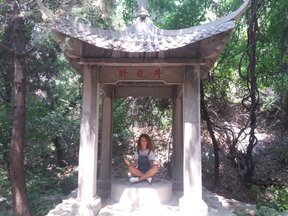
How to get to Qufu and how to get around in the city in your 2 days in Qufu:
Getting to Qufu is a seamless journey with several convenient options.
If you’re coming from Beijing or other major cities, taking a high-speed train is a popular choice. The Beijing-Qufu High-Speed Railway offers swift connections, whisking you to Qufu’s railway station in a matter of hours.
Alternatively, you can fly into Jinan Yaoqiang International Airport and then take a comfortable airport shuttle or a taxi for the approximately two-hour drive to Qufu.
For travelers exploring nearby cities, intercity buses are readily available, offering a scenic route to Qufu.
Once you arrive, you can use local transportation within Qufu, such as taxis and buses. public transportation will make it easy to navigate this historically significant city, where Confucian culture and heritage await your discovery.
Where to stay for the 2 days in Qufu:
Qufu offers a range of accommodation options, but the best areas to stay are within close proximity to its historical treasures. For an immersive experience, consider staying in the heart of the city, around the Confucius Temple area. Here, you’ll find a selection of comfortable hotels and guest houses that provide easy access to Qufu’s UNESCO World Heritage Sites, including the Confucius Temple, Mansion, and Cemetery. Alternatively, the Qufu Railway Station area offers convenient lodgings for travelers arriving by train, with various hotels catering to different budgets. The serene surroundings and traditional architecture make these areas not only convenient but also culturally enriching places to base your exploration of Qufu’s profound Confucian heritage.
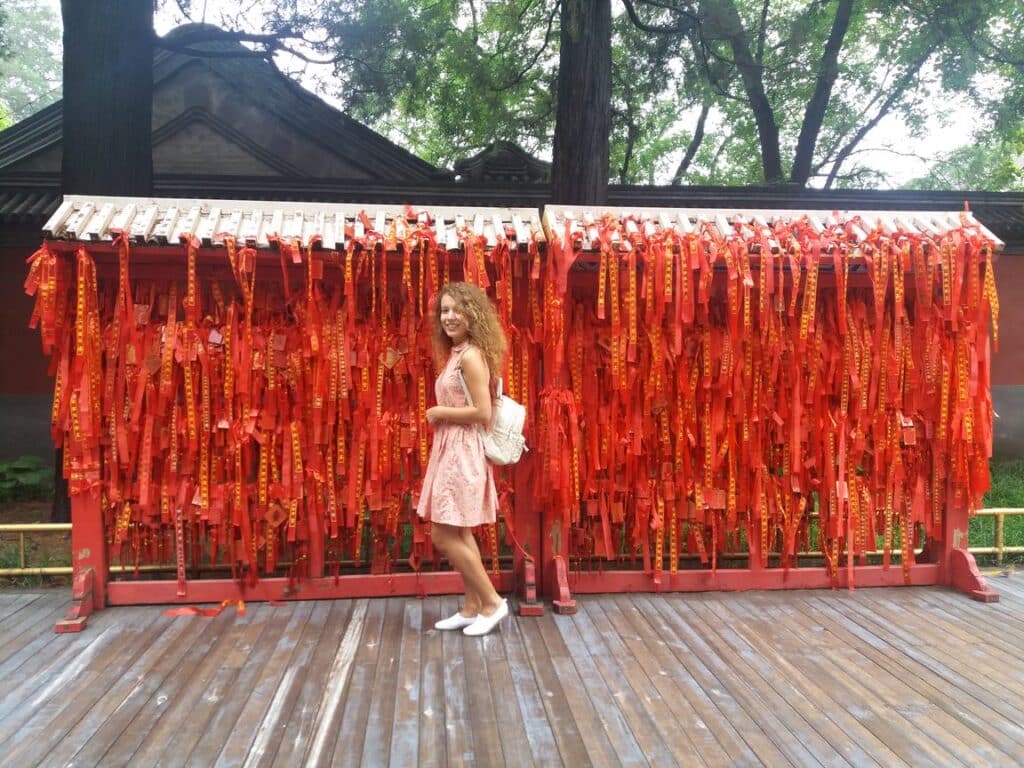
Tip: Two days in Qufu offer a perfect opportunity to delve deep into the city’s rich Confucian heritage and explore its cultural treasures.
What to see and to do in 2 days in Qufu:
Day 1 of 2 days in Qufu:
Confucius Temple
Begin your 2 days in Qufu at the iconic Confucius Temple, a magnificent complex that houses historical relics and pays homage to the revered philosopher. The temple is easily accessible by taxi, bicycle, or a leisurely walk from various parts of the city. Once you arrive, prepare to immerse yourself in a world steeped in history and Confucian philosophy. The temple complex is a sprawling testament to China’s deep reverence for Confucius, featuring magnificent architecture, tranquil courtyards, and ornate halls. Be sure to visit the Hall of Great Accomplishment, where you’ll find a statue of Confucius surrounded by symbolic offerings. As you explore further, discover the renowned cypress trees, some over a thousand years old, which lend an air of timeless wisdom to the surroundings. Confucius Temple is not just a historical site. It’s a living testament to the enduring legacy of Confucianism in Chinese culture.
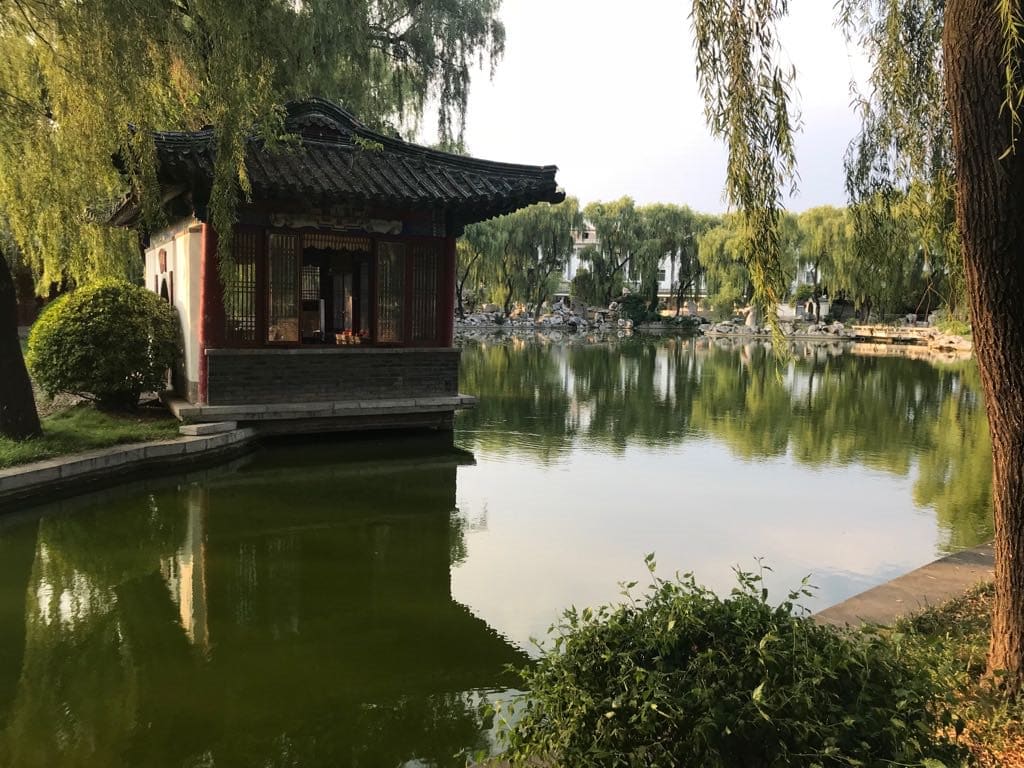
Tip: As of my last knowledge update in September 2021, the entrance fee for Confucius Temple (Kong Miao), was approximately 150 RMB for adults. Please note that admission fees can change over time, so it’s essential to check the latest prices and visiting hours before planning your trip. Additionally, there might be discounts available for students and seniors, so inquire about those if they apply to you. Also, consider purchasing a combined ticket if you plan to visit multiple Confucian historical sites in Qufu, as this might offer cost savings.
Confucius Mansion
Stroll through the tranquil Confucius Mansion nearby, where you can admire traditional architecture and beautiful gardens. Located near the heart of the city, the mansion is easily accessible by taxi, bicycle, or a pleasant walk from various parts of Qufu. Upon arrival, you’ll step back in time to explore the well-preserved ancestral home of Confucius’ direct descendants. The mansion boasts exquisite architecture, traditional courtyards, and beautifully landscaped gardens. As you wander through the opulent halls and living quarters, you’ll gain insight into the luxurious lifestyle of the Kong family. Don’t miss the impressive collection of cultural relics, ancient manuscripts, and historical artifacts on display, providing a deeper understanding of Confucian traditions and their enduring influence. Confucius Mansion is not just a historic residence. It’s a living testament to the legacy of one of the world’s most revered philosophers.
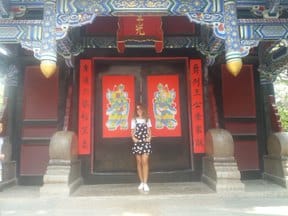
Tip: The entrance fee for the Confucius Mansion (Kong Fu) in Qufu, China, was approximately 70 RMB.
Cemetery of Confucius
Afterward, visit the tranquil Cemetery of Confucius, where you can witness the final resting place of Confucius and his descendants amidst serene pine forests. The cemetery stands as a testament to the enduring respect for Confucius and his teachings. Upon arrival, you’ll find yourself surrounded by a serene forest of ancient pine trees, their branches whispering secrets of centuries past. As you explore the meticulously maintained pathways, you’ll encounter the final resting places of Confucius and his descendants, each marked by majestic stone tablets and intricate carvings. Don’t miss the towering stelae that chronicle Confucian classics. It provides an enlightening glimpse into the wisdom that has shaped Chinese culture for generations. The Cemetery of Confucius is not just a burial site. It’s a place of profound reverence. It offers visitors a unique opportunity to connect with the profound legacy of Confucianism.
Tip: The entrance fee for the Cemetery of Confucius (Kong Lin) in Qufu, China, was approximately 30 RMB for adults.
Day 2 of 2 days in Qufu:
Confucius Six Arts City
Tip: The entrance fee for Confucius Six Arts City in Qufu, China, was approximately 70 RMB for adults.
Ancient City
Explore the ancient city walls and gates. Upon arrival, visitors are greeted by the majestic towers, which have stood as iconic symbols of Qufu’s historical significance for centuries. Ascend the Bell Tower for breathtaking panoramic views of the city and the surrounding countryside, and don’t miss the opportunity to witness the ancient bell-ringing ceremony, a cherished tradition that resonates with the city’s rich history. The neighboring Drum Tower offers a fascinating glimpse into traditional Chinese percussion and timekeeping. Marvel at the intricate drumming performances and gain insight into the importance of drums in ancient Chinese culture. The Bell and Drum Towers are not just architectural marvels. They are living embodiments of Qufu’s cultural heritage. It offers a captivating experience for travelers seeking to connect with the city’s past.
The Kong Family Mansion
End your journey with a visit to the Kong Family Mansion, offering a glimpse into the life of Confucius’ descendants. With two days in Qufu, dedicated to these historic sites, you’ll gain a profound understanding of Confucianism and Qufu’s enduring cultural legacy. Explore the well-preserved halls, living quarters, and reception rooms, each rich with historical artifacts and intricate detailing. Be sure to visit the Memorial Hall, which houses a vast collection of Confucian relics, documents, and ancient manuscripts. As you wander through the labyrinthine halls and corridors, you’ll gain a deeper appreciation for the profound influence of Confucianism on Chinese culture and history. The Kong Family Mansion is not just a historic residence. It’s a living testament to the enduring legacy of Confucius and his descendants. It provides a captivating experience for travelers seeking to connect with the city’s past.
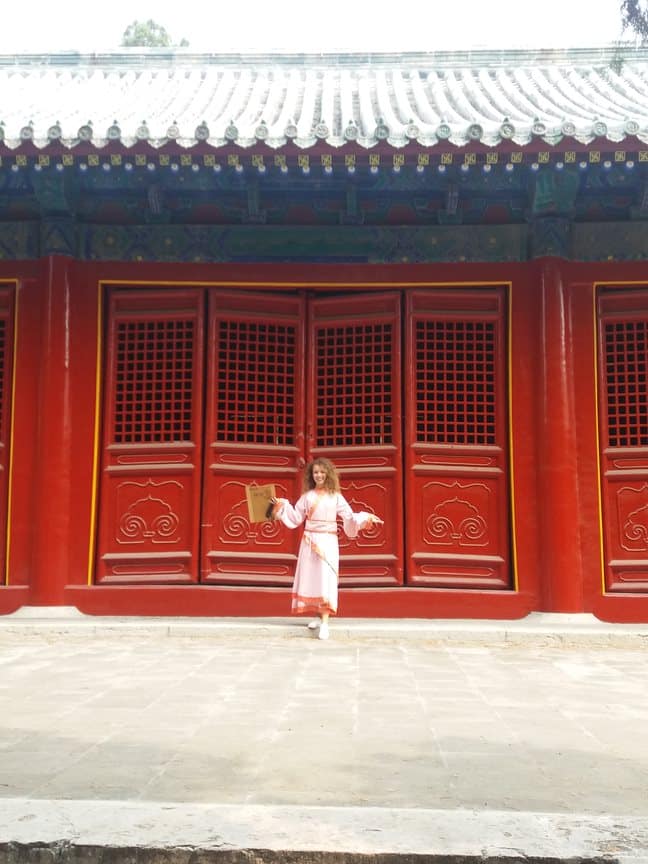
Tip: The entrance fee for the Kong Family Mansion (Kong Fu) in Qufu, China, was approximately 90 RMB for adults.
What to eat in Qufu:
Beijing street food:
Qufu offers a variety of dining options where you can savor delicious local cuisine and traditional Chinese dishes. During your 2 days in Qufu, you have all the time you need to try new delicacies. Here are some recommended places to eat in Qufu:
Confucius Mansion Restaurant (Kong Fu Jiu Lou):
Located within the Kong Family Mansion, this restaurant offers an authentic dining experience in a historic setting. Enjoy traditional Shandong dishes amidst the tranquil courtyards.
Qufu Teahouse (Qufu Chayuan):
A visit to a teahouse is a must in China, and this teahouse offers a selection of teas and light snacks. It’s a great place to relax and soak in the local culture.
Local Noodle Shops:
Qufu is known for its delicious noodles, including Kong Family Noodles (Kong Fu Mian) and Confucius Noodles (Kong Zi Mian). You’ll find numerous small noodle shops throughout the city serving these specialties.
Street Food Stalls:
Explore the streets of Qufu to discover street food vendors selling a variety of snacks, from dumplings to grilled meats. The flavors are authentic, and you’ll have a chance to interact with locals.
Qingfeng Restaurant (Qingfeng Lou):
This restaurant offers a mix of Shandong and Cantonese cuisine. It’s a popular spot for both locals and tourists, known for its flavorful dishes.
Yihong Restaurant (Yihong Jiulou):
Another local favorite, Yihong Restaurant specializes in traditional Shandong cuisine. Try their seafood dishes and local specialties.
Confucius Wine House (Kong Jiu Wu):
If you’re interested in tasting local rice wine or other alcoholic beverages, this is a great place to visit. They often pair drinks with local snacks.
Western Restaurants:
If you’re craving something different, some hotels and restaurants in Qufu also offer Western cuisine options.
Remember that Qufu’s culinary scene is deeply influenced by Shandong Province’s flavors, characterized by freshness and a balance of salty and savory tastes. Enjoy exploring the local food scene and trying the regional specialties during your visit!